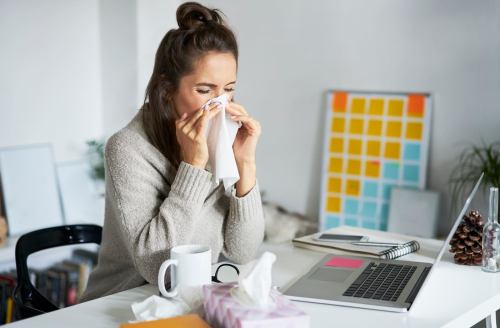Not a fever dream: There’s a reason why your cold lasts longer than everyone else’s
Do your colds always seem to last longer and be much worse than everyone else's? One study says it might be because of the bacteria in your nose.

Once someone in the office starts coughing, you know it’s time to dig into your stash of immunity-boosters. But even after upping your zinc intake and sipping ginger tea non-stop, you still get sick with symptoms that come on way stronger—and last much longer—than everyone else’s around you. So what gives? According to new research, it might have to do with the bacteria in your nose.
In a study published in the journal Scientific Reports, researchers tested the nasal microbiomes of 152 participants before and after they were given a cold from the same virus strain. After getting sick, there were six different patterns people fell into, and the types of bacteria in those patterns resulted in different levels of cold severity. The one that stood out the most was staphylococcus: The people with the highest amounts in their noses also had the most severe symptoms.
The bacteria that stood out the most was staphylococcus: The people with the highest amounts in their noses also had the most severe symptoms.
“What we’re reporting is an association, so it’s entirely possible that the fact that you have staph in your nose and you have more symptoms is not directly related,” said study author Ronald Turner, MD, in a press release. “It may well be that there’s some underlying host characteristic that makes you likely to have staph in your nose and also makes you more likely to become ill.”
Whatever the case, it could be an explanation for why you’re still left sneezing and coughing long after anyone else. So maybe your best bet is strengthening your immune system as much as possible before flu season hits to make sure those nasty viruses don’t stand a chance when it comes to wreaking havoc on your health.
Can ginger baths really combat cold and flu season? Here’s what you should know. Or, find out how to hack Starbucks’ “medicine ball tea” to give it extra cold-fighting powers.
Sign Up for Our Daily Newsletter
Get all the latest in wellness, trends, food, fitness, beauty, and more delivered right to your inbox.
Got it, you've been added to our email list.










